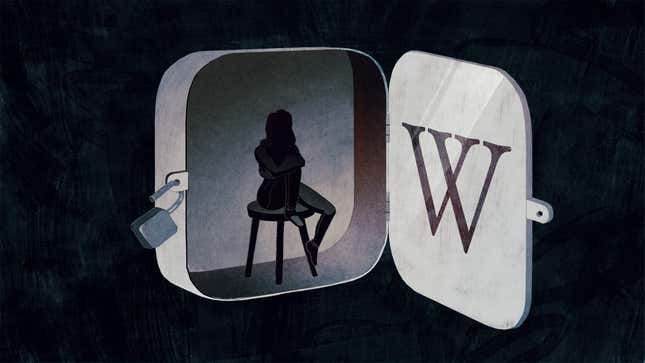Wikipedia Exposes Porn Performers to Stalking, Harassment—And Visits From CPS
Latest
Last week, a porn performer had Child Protective Services show up unannounced at her front door after an anonymous caller falsely claimed she was throwing “swinger parties” in front of her children. The caller lacked the kind of intimate knowledge one would expect of someone who personally knew the performer, who uses a stage name. But they did have one crucial bit of information: her legal name.
The performer can’t know for sure who made the call, or why, but she guesses that it was someone who, as she put it, “disagreed with my line of work.” Similarly, she can’t know for sure where they got her legal name, allowing them to make the report, but she has a strong guess: Wikipedia. “They used that information to try to remove my children from my home,” she told me, speaking on condition of anonymity, out of fear that others might get the idea to make similar CPS calls.
This woman is just one of dozens of porn performers who have had their legal names published on Wikipedia, right alongside their stage names. The site isn’t alone: IMDb, that cataloger of mainstream Hollywood acting credits, also houses legal names.
These sites dispassionately prize the integrity and consistency of their databases at the expense of the privacy and safety of human beings
Porn performers take stage names to protect themselves, from quote-quote “fans” and anti-porn zealots, whose purported moral oppositions to the industry can manifest into personal acts of aggression. For a performer, publication of a legal name can lead to anything from menacing phone calls to being unsafe at home. It can out performers to loved ones, put their family members at risk, and shut down job prospects outside of porn. It can mean having their children interviewed for four hours by CPS, as happened with the anonymous performer above.
Whether careless or knowing, Wikipedia and IMDb put performers at risk of abuse, harassment, stalking, and violence. They do so while hiding behind the shields of company policy, user generated content, and public information. That is to say: These sites dispassionately prize the integrity and consistency of their databases at the expense of the privacy and safety of human beings.
It used to be that Wikipedia and IMDb were far from the worst offenders on this front. For years, a site by the name Porn WikiLeaks doxxed more than 15,000 porn performers, publishing not only their legal names, but also, in some cases, sensitive information like home addresses and the names of relatives. (Many of the legal names were reportedly obtained via a leak from an adult industry medical database.) In August, the site was purchased by the porn company Bang Bros, which took over the domain and shared a video of its effort to destroy Porn WikiLeaks’ store of sensitive information. In a P.O.V. clip someone sprayed lighter fluid on a pile of hard drives, before flicking open a lighter and tossing it on top. The ensuing flames seemed an accurate representation of the degree of anger directed at the site—and the desire to see it finally disappear.
Still, shuttering the site was not a cure-all, even Bang Bros admitted as much, writing in a statement that the closure “doesn’t purge the internet of all possible ties to real names.” Indeed, I first became aware of the issue when performer Sinnamon Love pointed out in a tweet at the time of Bang Bros’ announcement, “@Wikipedia enabled doxing of porn performers by allowing biographies to be updated with real names.” When I started looking into the Wikipedia issue, Alana Evans, president of the Adult Performers Actors Guild (APAG), a porn industry union, mentioned the problem was rife on IMDb as well.
This isn’t to suggest that Wikipedia or IMDb are remotely comparable to PornWikiLeaks in scope: When checking against a list of roughly 50 performers, I found a couple dozen examples of purported legal names listed on Wikipedia and IMDb—a far cry from PornWikiLeaks’ several thousands. The same can be said of degree: PornWikiLeaks had directly linked to Love’s children’s Facebook profiles, enabling horrific, heart-breaking harassment. (Wikipedia and IMDB’s entries only features performers’ legal names.) On the individual level, though, the effects of making these names public can be devastating.
“I couldn’t quantify the damage it’s done.”
When Kayden Kross, a porn director and performer, first saw her legal name appear on Wikipedia, she says, “My gut just sank.” She explains, “Stage names are the first line of defense against a world that often treats sex workers as disposable, deserving of abuse, and complicit in the violence done against them.” As a result of her legal name being made public, says Kross, she’s had to file numerous police reports for stalking and harassment. In one case, a stalker has used her legal name to document Kross’s “entire family tree,” complete with “where each person resides and odd details about them.” Although she can’t be certain where the information originates, Wikipedia, which until very recently published her legal name alongside her stage name, is one of the first hits on a Google search for “Kayden Kross.” Additionally, Kross says, people have used her legal name to create social media accounts and attempt to interact with family members and friends. “I couldn’t quantify the damage it’s done,” she says.
-

-

-

-

-

-

-

-

-

-

-

-

-

-

-

-

-

-

-

-

-

-

-

-

-

-

-

-

-

-

-

-

-

-

-

-

-

-

-

-








































